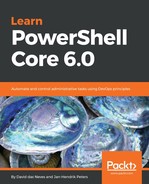You need to learn that PowerShell is an object-oriented programming or scripting language, and it is based on .NET. What does that actually mean? Every parameter and every return value are of a specific type. And because PowerShell is based on .NET, these are .NET types. There are different ways to retrieve the type of an object:
"String"
[System.DateTime] "24/08/2018"
"String".GetType()
([System.DateTime] "24/08/2018").GetType()
Get-Member -InputObject "String"
This differs from most of the other scripting languages, where you primarily pass and retrieve strings, and makes PowerShell a scripting language with a lot of similarities to full stack developing languages. In the following overview, you will see the commonly used types:
# sequence of UTF-16 code units.
[String]
# character as a UTF-16 code unit.
[Char]
# 8-bit unsigned integer.
[Byte]
# 32-bit signed integer
[Int]
#64-bit signed integer
[Long]
# 128-bit decimal value
[Decimal]
# Single-precision 32-bit floating point number
[Single]
# Double-precision 64-bit floating point number
[Double]
# Boolean - can be $True or $False
[Bool]
#.NET class, which holds the combination of date and time
[DateTime]
# A XML-Object - can be greatly used to store and load configuratio data.
[XML]
# An array of different objects
[Array]
# Hashtable is an associative array, which maps keys to values.
[Hashtable]
Unlike other programming languages, you don't need to define the types for the variables you use. PowerShell will choose the best fit for the type at the moment you initialize the variables for the first time.
